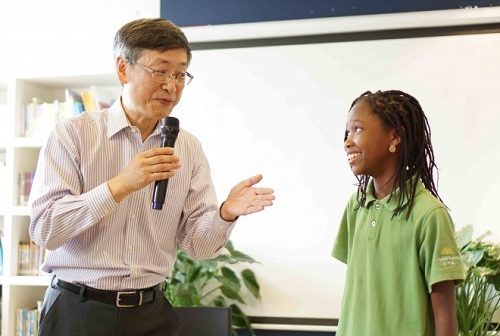
We took part in The Upside of “I Don’t Know”, a talk presented by Jing Huang, Head of Harvard Center Shanghai, hosted by Daystar Academy. Having studied sociology back in college and been enthusiastic about child psychology since having his own two sons, Jing Huang formulated parenting and schooling advice based on the results of his home “social experiments”.
Huang, like any parent, values education, but he also believes that teaching children how to learn and interact with the world is as important as “book knowledge”. As a result, Huang has created multiple teaching modules on character education, including team work, leadership, how to be a follower, resilience, and curiosity, the theme of his presentation.
Jing Huang gave his talk in both Chinese and English, sometimes serving as his own translator. He began by clarifying the topic: he does not advocate that “ignorance is bliss” or wuzhizheku, but rather, gave an example of how detrimental bu dong zhuang dong (pretending to know what you don’t know) can be to one’s education. The reason is that if you pretend to know what you don’t know, then either you are not motivated to truly learn, or, you won’t ask or study up on the topic for fear of being found out (and losing face). For Huang, bu dong zhuang dong is just one example of the importance of nurturing a child’s creativity, for as we grow older, we stop questioning things for fear of being laughed at, shut down, or criticized. Yet, a child who is too passive to question things is not motivated to learn, and is likely also lacking critical thinking skills. Hence, the importance of encouraging children (and adults) to admit “I don’t know”.
The humorous and interactive presentation involved both parents and children, followed by a parent-only Q&A session with details on practical tips. Here’s what we took home from Jing Huang’s talk that can be applied by any parent or teacher:
Teach your child the upside of “I don’t know”
According to Huang, we are afraid of asking questions because we worry about how we will look in the eyes of the person answering. However, if we put ourselves in their shoes, we would find that they find it flattering to be asked a question because it shows that you value and rely on their insight and knowledge. After all, you chose them—out of every one—to ask your question, proving their overall importance. Being asked a question should be an ego boost, wherein you, the questioner, provide them with positive feedback (fankui). An ego boost is always satisfying, which is why we can conclude that asking people questions make them happy. Since you are the one always asking questions when you’re around them, they should feel happy around you. As such, you become labelled as a person who makes them happy. Try asking people questions and watch your popularity rise!
Teach children to be “curious”
Teachers and parents often complain about children having “focus issues”—but what allows children to focus? Paying attention is focusing. Children will only pay attention if they are interested in the subject and want to find out the answer to a burning question they have. Which is to say that if children are not curious, they will not be interested in finding out the answer—they won’t even have a question to answer!
Thereby, teaching your child curiosity is preparing him to become a critical thinker who questions ideas, and pays attention–whether by focusing in class or by being observant in daily life.
How do we teach curiosity? Huang reminds us that curiosity is a skill, and like any skill it requires practice. As parents and educators, we can help children heighten their curiosity levels by pointing out things and asking them questions, eventually leading them to make their own observations and form their own questions, until they think like scientists, forming hypothesis and discovering their own answers via research and experimentation.
Teach children to find the answer on their own
Some children will say “I don’t know” automatically, relying on this automatic response like a crutch. A child might expect an adult, whether a parent, teacher, tutor or sibling, to provide the answer instantly, walk him through the process of finding the answer, or at least point him in the right direction so he doesn’t need to spend time contemplating or looking for the answer on his own.
For such children, Huang advises parents to swallow your pride and pretend you don’t know the answer. By playing dumb, you give your child an opportunity to teach you. The smug smirk he’ll get to exhibit later as he rubs the answer in your face will surely motivate him to discover the answer on his own for once.
Throughout his talk, Jing Huang references self-improvement books that he recommends everyone to read, including The Power of Habit by Charles Duhigg and the Outliers by Malcolm Gladwell–both of which I’m reading now!
Photos: courtesy of Daystar Academy




